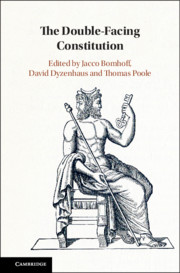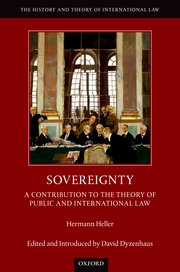
David Dyzenhaus, D.Phil.
University Professor of Law and Philosophy
Universität Toronto
Born in 1957 in Johannesburg, South Africa
Studied Philosophy of Law at the University of Oxford, and Law and Political Science at the University of the Witwatersrand, Johannesburg
Arbeitsvorhaben
The Long Arc of Legality
I am working on a book titled The Long Arc of Legality, which traces a trajectory in modern thought about the role of law in constituting a legitimate political order, from Thomas Hobbes to this day. It seeks to vindicate a claim that will seem part and parcel of Hobbes's general authoritarian political philosophy and deeply repugnant to a liberal democratic sensibility - that law provides us with a "public conscience". For the image of law as our public conscience requires us to take not only our laws to be legislated by our sovereign, but also our moral values. The public or enacted laws of a civil society are the repository of the society's values that the individuals in that society must take to justify state coercion.I shall argue that Hobbes's account of legality shows why the idea of law as a public conscience should be accepted, as long as we are prepared to adopt a certain kind of pragmatist view of moral inquiry. Our compulsory public morality - the morality that we feel is settled and important enough that it be put into law - is simply a subset of the set of judgments that have survived the tribunal of experience and inquiry.
My claim is that Hobbes's philosophy of law can help to show why that idea is plausible, as it shows us how fundamental principles of legality shape our inquiry. Our confidence in these compulsory moral judgments is in part built upon the principles contained in the institutional make-up of law. I have in mind, first, the principle that requires that individuals have the right to ask an independent official for reasons why the law applies to them in a way that addresses them as responsible agents, and second, the principles that underpin legal mechanisms for changing law in a way that makes the judgments embedded in the law revisable in light of further experience. It is these kinds of principle that make it possible both for those who find themselves relegated by the law to second-class status to ask a judge, "But, how can that be law for me?", and for an internal legal imperative to kick in that requires reform.
Recommended Reading
Dyzenhaus, David. Hard Cases in Wicked Legal Systems: South African Law in the Perspective of Legal Philosophy. Oxford: Clarendon Press, 1991; 2nd edition as Hard Cases in Wicked Legal Systems: Pathologies of Legality. Oxford: Oxford University Press, 2010.
-. The Constitution of Law: Legality in a Time of Emergency. Cambridge: Cambridge University Press, 2006.
-. Legality and Legitimacy: Carl Schmitt, Hans Kelsen, and Hermann Heller in Weimar. Oxford: Clarendon Press, 1997.
Kolloquium, 01.11.2016
Der lange Bogen der Legalität
Ich vermute, die meisten von Ihnen sind glücklicherweise mit der Rechtsphilosophie nicht vertraut und gehören doch zu einem ihrer verfeindeten Lager. Entweder sind Sie Naturrechtler, weil Sie der Meinung sind, dass es eine gute Sache sei, in einem Rechtsstaat zu leben, und also schreiben Sie dem Recht als solchem eine moralische Qualität zu. Oder Sie gehören zu den Rechtspositivisten, weil Sie der Meinung sind, dass das Recht gesetzt und also positives Recht sei, von Menschen geschaffen und von denen gemacht, die die Macht dazu haben und dementsprechend auch seinen Gehalt bestimmen. Daher meinen Sie, dass das Recht nicht notwendigerweise eine moralische Qualität hat. Ich möchte Sie davon überzeugen, dass beide intuitiven Auffassungen zutreffen, obwohl man die Schlussfolgerung fallen lassen muss, dass das Recht als solches keine notwendige moralische Qualität hat. Meine Argumentation hängt von einer großen Erzählung über die Moderne ab - was vielleicht unklug ist.
Die Moderne (oder meine Moderne) in der Rechtstheorie beginnt 1651, und zwar mit der Veröffentlichung von Thomas Hobbes? Schrift Leviathan, in der er eine Theorie des Rechtsstaats darlegt. Diese Theorie wird in den 1920er und 1930er Jahren von dem österreichischen Rechtsphilosophen Hans Kelsen in seiner Reinen Rechtslehre weiterentwickelt, in der er erklärt, wie das Recht seine eigene Produktion regelt. In den 1960er Jahren zeigt der amerikanische Rechtstheoretiker Lon L. Fuller, dass ein Herrscher, der durch das Recht herrschen will, sich an die Prinzipien der Rechtmäßigkeit bzw. Legalität halten muss. Diese Prinzipien laufen ihrerseits auf eine "innere Moral" des Rechts hinaus, die die Würde der dem Recht unterliegenden Personen schützt. Die Reise von Hobbes über Kelsen (und den britischen Rechtspositivisten H. L. A. Hart) hin zu Fuller beschreibt den "langen Bogen der Legalität" - der Titel meines Arbeitsvorhabens in diesem Jahr am Wissenschaftskolleg.
Hobbes gilt jedoch mit seiner Argumentation, dass de facto ein Souverän immer legitim (de jure) ist, als äußerst autoritärer Philosoph; für Kelsen ist dagegen jeder bestehende Staat ein Rechtsstaat, aber gleichzeitig kann ein Gesetz seiner Auffassung nach jeden wie auch immer gearteten Gehalt haben. Und Fuller weist den Rechtspositivismus sowohl von Kelsen als auch Hobbes zurück, den er bei beiden für falsch hält. Von den dreien repräsentiert vielleicht nur Fuller die Tradition des Naturrechts, nach der ein ungerechtes Gesetz kein Gesetz ist - lex injusta non est lex. Doch nach Auffassung von Fullers positivistischen Kritikern sind seine höchst formalen Prinzipien der Legalität - Gesetze müssen allgemein, öffentlich, nicht rückwirkend, verständlich etc. sein - nicht dazu geeignet, dem Gehalt der Gesetze Beschränkungen aufzuerlegen.
Ich möchte darlegen, dass eine Ordnung des positiven Rechts durch solche Prinzipien strukturiert wird und dass diese den Gehalt der Gesetze sehr wohl beschränken. Zuerst wurden sie von Hobbes als "Naturgesetze" formuliert, als "die wahre und einzige Moralphilosophie", die "nichts anderes (ist) als die Wissenschaft von dem, was im Umgang und in der Gesellschaft der Menschheit gut und schlecht ist".
Je nachdem, wie weit ich mit dem Aufsatz gekommen bin, an dem ich gerade schreibe, möchte ich diese Argumentation in den Kontext meiner Diskussion von Artikel 4 der Weimarer Verfassung setzen, der sich mit dem Verhältnis zwischen dem deutschen Recht im Inland und dem internationalen Recht befasst.
Publikationen aus der Fellowbibliothek
Dyzenhaus, David (Cambridge, 2022)
The long arc of legality : Hobbes, Kelsen, Hart
Dyzenhaus, David (2020)
Dyzenhaus, David (Cambridge, 2020)
The double-facing constitution
Dyzenhaus, David (Oxford, 2019)
Sovereignty : a contribution to the theory of public and international law History and theory of international law
Dyzenhaus, David (2018)
Dignity in administrative law : judicial deference in a culture of justification
Dyzenhaus, David (2012)
Constitutionalism in an old key : legality and constituent power$dDavid Dyzenhaus
Dyzenhaus, David (2012)
Hobbes and the authority of law
Dyzenhaus, David (Oxford [u.a.], 2010)
Hard cases in wicked legal systems : pathologies of legality
Dyzenhaus, David (Cambridge [u.a.], 2006)
The constitution of law : legality in a time of emergency
Dyzenhaus, David (Oxford [u.a.], 2003)
Legality and legitimacy : Carl Schmitt, Hans Kelsen and Hermann Heller in Weimar



